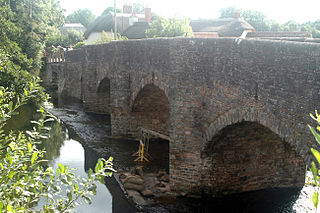Related Research Articles

Hemyock is a village and civil parish in Devon, England. It is about 8 miles north-west of Honiton and 5 miles (8 km) south of the Somerset town of Wellington. The 2011 Census recorded the parish's population as 1,519. Hemyock is part of the electoral ward of Upper Culm. The population of this ward at the above census was 4,039. The River Culm flows through Hemyock. Hemyock was the former home of the St Ivel dairy processing plant, formerly where the butter-spreads 'St Ivel Gold' and 'Utterly-Butterly' were produced before being moved to a factory in the north of England.

The River Culm flows through the Devon Redlands in Devon, England and is the longest tributary of the River Exe. It rises in the Blackdown Hills at a spring near RAF Culmhead in Somerset, and flows west through Hemyock, then Culmstock to Uffculme. The river turns south, through Cullompton, skirting the northern boundary of Killerton Park to join the River Exe on the north-western outskirts of Exeter. The name of the river is thought to mean 'knot' or 'tie', in reference to the river's twists and loops.

The Blackdown Hills are a range of hills along the Somerset-Devon border in south-western England, which were designated an Area of Outstanding Natural Beauty (AONB) in 1991. In November 2023, it has become 'Blackdown Hills National Landscape'

North Devon is a constituency represented in the House of Commons of the UK Parliament since 2019 by Selaine Saxby of the Conservative Party.

Churchstanton is a village and civil parish in Somerset, England, situated within the Blackdown Hills Area of Outstanding Natural Beauty, on the River Otter 5 miles (8.0 km) south of Taunton.

Buckland Monachorum is a village and civil parish in the West Devon district of Devon, England, situated on the River Tavy, about 10 miles north of Plymouth.

Uffculme is a village and civil parish located in the Mid Devon district, of Devon, England. Situated in the Blackdown Hills on the B3440, close to the M5 motorway and the Bristol–Exeter railway line, near Cullompton, Uffculme is on the upper reaches of the River Culm. The population of the parish, according to a 2020 estimate, is 3,090. It is surrounded, clockwise from the north, by the parishes of Culmstock, Hemyock, Sheldon, Kentisbeare, Cullompton, Willand, Halberton and Burlescombe.

Culmstock is a village and civil parish in Mid Devon, England, centred 10 miles from Tiverton and 6 NE of Cullompton. It is laid out on both sides of the River Culm; the village is joined by a single old narrow stone bridge across the river. The population of the parish at the 2011 Census was 554. The northern boundary of the parish forms part of the Devon – Somerset border and clockwise from there it is surrounded by the Devon parishes of Hemyock, Uffculme, Burlescombe and Holcombe Rogus.

Aunk is a small hamlet and former manor in the parish of Clyst Hydon in East Devon, England. The place-name is of Celtic origin along with other local place-names such as Hemyock and Whimple.

Dunkeswell is a village and civil parish in East Devon, England, located about 5 miles (8.0 km) north of the town of Honiton. At the 2001 census, the parish had a population of 1,553, reducing to 1,361 at the 2011 Census. There is an electoral ward with the same name whose population at the above census was 2,000. The parish is surrounded, clockwise from the north, by the parishes of Hemyock, Luppitt, Combe Raleigh, Awliscombe, Broadhembury and Sheldon.

Clayhidon is a village and civil parish in Mid Devon, England. The parish church is St. Andrews. The parish is in the Blackdown Hills and its northern and eastern boundaries form part of the Devon – Somerset border. From the south-east it has boundaries with the Devon parishes of Upottery, Luppitt and Hemyock.

Peter Orlando Hutchinson (1810–1897) was an English Victorian diarist and artist. He was born in Winchester, but spent all his adult life in Sidmouth, Devon.
Walter of Douai was a Norman knight, probably at the Battle of Hastings, and a major landowner in South West England after the Norman Conquest, being feudal baron of Bampton in Devon and of Castle Cary in Somerset. He is given various names and titles in different sources including: Walter de Douai. Douai is sometimes written as Dowai. He has also been called Gautier de Douai and later Walter the Fleming.

Moreleigh or Morleigh is a village and former civil parish, now in the parish of Halwell and Moreleigh, in the South Hams, district, in the county of Devon, England. In 1961 the civil parish had a population of 102.

Hemyock Castle is a ruined 14th-century castle in the village of Hemyock, Devon, England. It was built by Sir William Asthorpe after 1380 to a quadrangular design. It would have been visually impressive, but not particularly functional, with various intrinsic flaws. By the 16th century it had fallen into ruin and, following its use during the English Civil War in the mid-17th century, it was pulled down (slighted). In the 21st century the site is occupied by the fragments of the original castle; and Castle House, an 18th-century house built within the site, and restored as private home at the end of the 20th century.

Perlycross: a tale of the western hills is a three-volume novel by R. D. Blackmore published in 1894. The story is set in eastern Devon around 1830.
Uffculme School is a mixed secondary school located in Uffculme in the English county of Devon.

Culm Davy is a historic manor and present-day hamlet within the parish of Hemyock in Devon.

Hemyock railway station served the village of Hemyock, Devon, England, from 1876 to 1963 on the Culm Valley Light Railway.
References
- 1 2 "THE HUNDREDS OF DEVON". GENUKI. Retrieved 8 April 2018.